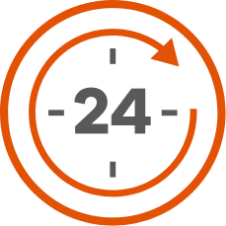Trulance was tested in patients over a 12-week study period
Patients had 2 bowel movements (any bowel movement) in a week, prior to taking Trulance in the study.
Trulance helped patients have 5 bowel movements a week on average*
Before entering the study, patients had an average of one complete bowel movement (bowel movement resulting in feeling completely empty) in 3 weeks.
Trulance helped adults have 3 complete bowel movements a week on average*


Trulance can help provide relief from your constipation in as little as 24 hours*
Remember that results can vary and relief can happen more quickly for some people than for others.


For continued results, take Trulance every day†
In two 12 week clinical trials, many patients taking Trulance maintained their constipation relief with continued use.
*In clinical studies, more patients had bowel movements with Trulance vs placebo. The results were seen without the use of laxatives.
†Or as directed by your doctor.
Trulance can help adults have “normal” (smooth, soft, sausage- or snake-shaped) bowel movements
Type 1
Separate hard lumps, like nuts. Hard to pass.Type 2
Sausage-shaped but lumpy.Type 3
Like a sausage but with cracks on surface.Type 4
Like a sausage or snake, smooth & soft.Type 5
Soft blobs with clear-cut edges.Type 6
Fluffy pieces with ragged edges, a mushy stool.Type 7
Watery, no solid pieces. Entirely liquid.Adapted from Lewis SJ, Heaton KW. Stool form scale as a useful guide to intestinal transit time. Scand J Gastroenterol. 1997;32:920-924.
Identify your treatment goals with the Bristol Stool Form Scale
The Bristol Stool Form Scale is a visual representation of the 7 most common types of bowel movements.
- Type 4 is considered a well-formed bowel movement; described as smooth, soft, sausage- or snake-shaped, and free of lumps or excess liquid
- Type 1 or 2 is often considered constipation, while Type 6 or 7 is often considered diarrhea
While it might seem awkward to talk about, telling your doctor which types of stool you typically have can help you create a treatment plan that works for you.
Type 1
Separate hard lumps, like nuts. Hard to pass.Type 2
Sausage-shaped but lumpy.Type 3
Like a sausage but with cracks on surface.Type 4
Like a sausage or snake, smooth & soft.Type 5
Soft blobs with clear-cut edges.Type 6
Fluffy pieces with ragged edges, a mushy stool.Type 7
Watery, no solid pieces. Entirely liquid.Adapted from Lewis SJ, Heaton KW. Stool form scale as a useful guide to intestinal transit time. Scand J Gastroenterol. 1997;32:920-924.
What Is Trulance?
Trulance® (plecanatide) 3 mg tablets is a prescription medicine used in adults to treat Irritable Bowel Syndrome with Constipation (IBS-C) and Chronic Idiopathic Constipation (CIC). Chronic means the constipation is long lasting. “Idiopathic” means the cause of the constipation is unknown. It is not known if Trulance is safe and effective in children less than 18 years of age.
What is the most important information I should know about Trulance?
- Do not give Trulance to children who are less than 6 years of age. It may harm them.
- You should not give Trulance to children 6 years to less than 18 years of age. It may harm them.
- Do not take Trulance if a doctor has told you that you have a bowel blockage (intestinal obstruction).
What Is Trulance?
What is the most important information I should know about Trulance?
- Do not give Trulance to children who are less than 6 years of age. It may harm them.
- You should not give Trulance to children 6 years to less than 18 years of age. It may harm them.
- Do not take Trulance if a doctor has told you that you have a bowel blockage (intestinal obstruction).
TRU.0023.USA.25